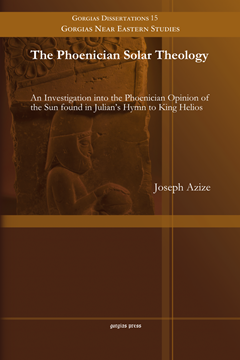Joseph Azize
The Phoenician Solar Theology (Paperback)
An Investigation into the Phoenician Opinion of the Sun found in Julian's Hymn to King Helios
By Joseph Azize
Series: Gorgias Near Eastern Studies 15
ISBN: 978-1-4632-0269-9
This book, the first study of its kind, contends that an authentic Phoenician solar theology existed, reaching back to at least the fifth or sixth century BCE. Through Azize’s examination, a portrait of a vibrant Phoenician tradition of spiritual thought emerges: a native tradition not dependent upon Hellenic thought, but related to other Semitic cultures of the ancient Near East, and, of course, to Egypt. In light of this analysis, it can be seen that Phoenician religion possessed a unique organizing power in which the sun, the sun god, life, death, and humanity, were linked in a profound system.
$112.00 (USD)
The Phoenician Solar Theology (Hardcover)
An Investigation into the Phoenician Opinion of the Sun found in Julian's Hymn to King Helios
By Joseph Azize
Series: Gorgias Near Eastern Studies 15
ISBN: 1-59333-210-6
This book, the first study of its kind, contends that an authentic Phoenician solar theology existed, reaching back to at least the fifth or sixth century BCE. Through Azize’s examination, a portrait of a vibrant Phoenician tradition of spiritual thought emerges: a native tradition not dependent upon Hellenic thought, but related to other Semitic cultures of the ancient Near East, and, of course, to Egypt. In light of this analysis, it can be seen that Phoenician religion possessed a unique organizing power in which the sun, the sun god, life, death, and humanity, were linked in a profound system.
$169.00 (USD) $101.40 (USD)


